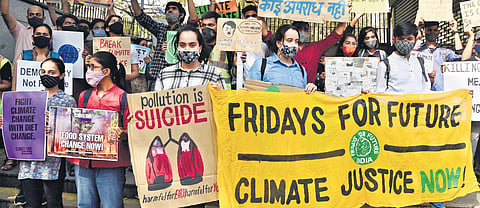

NEW DELHI: There is a need for a sustainable lifestyle as patterns of consumerism are a grave threat to the environment, Union Environment Minister Bhupender Yadav said on Tuesday, warning that there is 'no Planet B'.
Delivering the presidential address at the 20th Darbari Seth Memorial Lecture organised by TERI, Yadav said developing countries are highly vulnerable to climate change impact.
"Climate change mitigation is necessary but not sufficient. Even if the world stops greenhouse gas emissions today, hypothetically, still the accumulated greenhouse gases will lead to climate impact, requiring due consideration of climate change adaptation measures."
"Developing countries are highly vulnerable to climate change impact due to the dependence of large populations on climate sensitive sectors for livelihood," he said in his virtual address.
The minister said long-term strategies need to be guided by not only mitigation but also climate adaptation with a clear roadmap for provision of finance and technology.
"There is a need for a sustainable lifestyle as patterns of consumerism are a grave threat to the environment. Habit and attitude are much a part of the solution. Equity and climate justice should be a touchstone of any global climate response only then we can say that we have formulated strategies which are just and in reverence for mother earth, our only planet. There is no Planet B," Yadav said.
Remembering Darbari Seth, the founder of The Energy and Resources Institute (TERI) on his 100th birth anniversary, Yadav said he was a champion of energy conservation and environment protection.
"Darbari Seth's life and work embodied the message that business leaders should not only be concerned with profit but also care deeply for people, the planet and peace," he said.
He said that there are global environmental challenges and while addressing them, focus should also be on improving human development and sustainable development goals.
"As a nation, we have undertaken various national campaigns recently which mirror our focus on sustainable development goals (SDGs), be it Jal Jeevan Mission, Swachh Bharat Mission or Skill India, our programmes aim to do just that," the minister said.
The minister said that under the leadership of Prime Minister Narendra Modi, India has taken a multi-dimensional approach to all pillars of sustainable development with key measures like climate action, biodiversity conservation, forestry and land neutrality, waste recycling, phasing out single-use plastic, organic farming and clean energy.
He said that India is on track to achieve an exceeded target under the Paris Agreement to combat climate change.
India is the only G20 nation on track to meet its climate commitments, and the country has achieved 24 per cent deduction in emission intensity of its GDP between 2005 and 2016, thereby achieving a pre-2020 voluntary target, Yadav said.
"India is among the top five countries of the world in terms of installed renewable energy capacities. India's non-fossil fuel-based installed capacity of 151 GW is 39 per cent of the total installed capacity," he said.
The aspirational target of renewable energy capacity of 450 GW by 2030 was announced by the prime minister.
READ OPINION | Climate code red: India must go vocal and local
The minister also referred to the PM's Independence Day speech in which he announced the National Hydrogen Mission for generation and export of green hydrogen.
The environment minister highlighted that India's total forest and tree cover, as reported in the India State of Forest Report (ISFR) 2019, is 8,07,276 square km which is 24.56 per cent of the total geographical area of the country.
"Total carbon stock in India's forest is estimated to be 7,124.6 million tonnes, showing an increase of 42.6 million tonnes compared to the previous assessment of 2017," he said.
The minister also said that India is one of the 16 member countries of the electric vehicle initiative, a multi government policy forum for accelerating the introduction and adoption of electric vehicles worldwide.
He also said that ethanol blending in India has increased from 1.5 per cent in 2014 to 8.5 at present.
In 2013-14, about 38 crore litres of ethanol was purchased in the country which has now grown to more than 320 crore litres, the minister said.
"The government of India has resolved to meet the target of 20 per cent ethanol blending in petrol by 2025 which was earlier to be achieved by 2030," Yadav said.
Informing about the smart cities mission, he said that in a first-of-its-kind initiative, Climate Smart City Assessment Framework 2019 has been launched with the intent to provide a clear roadmap for cities and urban India towards combating climate change through mitigation and adaptation measures.
He also noted the recent report by the IPCC, saying the findings reaffirm that historic cumulative emissions are the source of the current climate crisis.
"The recent IPCC report has sounded Code Red. The findings reaffirm that the historic cumulative emission is the source of the current climate crisis. Equitable carbon and development space to achieve sustainable development requires due consideration to the principle of common but differentiated responsibilities and respective capabilities," he said.
The annual lecture series was initiated by The Energy and Resources Institute (TERI) in 2002 in memory of the institute's visionary founder and noted technocrat-industrialist, Darbari S Seth.